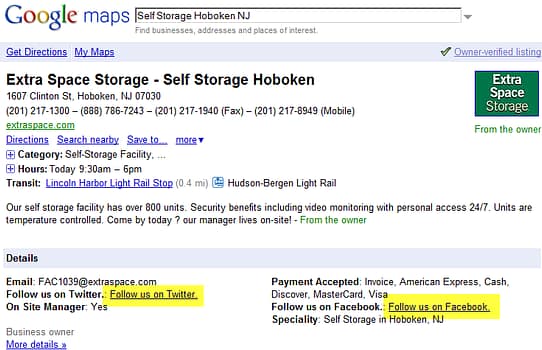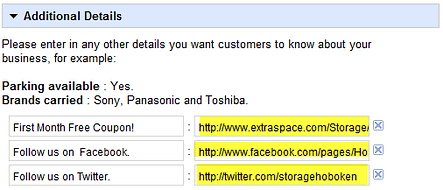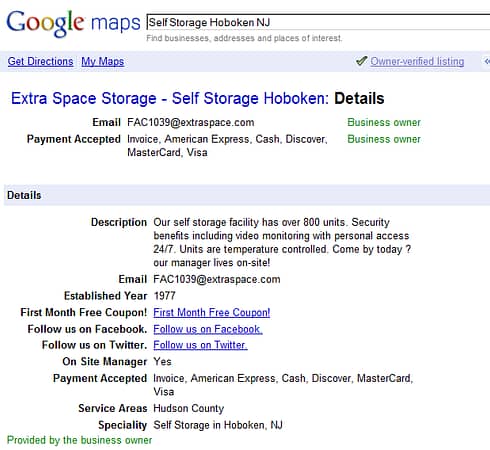By David Rodecker
It shouldn’t surprise you that when it comes to Core Data Providers (CDPs), information really is power. If you aren’t already familiar with CDP’s, they are a select group of companies that most internet destinations rely upon for business information in the United States.
Knowing what your CDP can offer – and what it can’t – is essential when choosing the right service for your enterprise. To help you out, I’ve compiled some basic facts about the three major online information conglomerates, Acxiom, InfoUSA, and LocalEze (aka AMACAI).
This brief survey will give you a clearer picture of CDPs, their capabilities, and how to utilize them intelligently for your enterprise.
Core Data Providers Offer a Partial View of Some of the Story
In a study commissioned by local.com, we determined that each of the three CDPs is about 52% to 72% accurate. CDP databases have some intrinsic flaws resulting from their primitive sources – often a literal transcription of Yellow Page books that are out-of-date, incomplete, and fail to account for emerging businesses and services. The study evaluated data complete data sets from three mid-sized cities: Irvine, CA; Trenton, NJ; and Philadelphia, PA. I can’t (yet) publish the entire evaluation and methods used, but here are some interesting statistics from the study:
Core Data Provider – Data Quality Comparison
|
Acxiom |
AMACAI (Localeze) |
InfoUSA |
| Listings (Sample Size) |
89,952 |
87,340 |
80,159 |
| Null Categories |
15.69% (14114) |
14.11% (12328) |
0% (0) |
| Null Street Addresses |
15.28% (13744) |
12.96% (11317) |
3.86% (3095) |
| Null Phone Numbers |
0 |
0 |
0 |
|
|
|
|
| Duplicates |
0.36% (325) |
6.32% (5516) |
13.48% (10806) |
| Categorization Accuracy |
95.96% |
72.73% |
89.90% |
| Phone Number Accuracy |
73.24% |
60.61% |
77.08% |
| Business Name Accuracy |
59.13% |
46.46% |
66.67% |
| Street Address Accuracy |
43.87% |
29.29% |
52.08% |
This basic flaw in their information gathering process led us to determine these seven basic flaws of most CDPs:
They’re Incomplete. Many business listings are missing, making them an unreliable source for all the information you need.
They’re Unreliable. These services are littered with businesses that no longer exist, or have changed names, ownership, and operations. We’re not just talking about recent one’s either, many of them have been out of business for several years.
They’re Inaccurate. Records are out-of-date – an old name here, an old phone number there – which can lead to hours of frustration for you and your company.
They’re Grammatically Incorrect. Typographical errors are common, making searches difficult and your life harder.
They’re Partially-Accurate. Extended data fields – URL, hours of operation, key names and positions, etc. — are not available for most business listings, and key details are absent.
They’re Messy. Lack of standardization in fields like business category and products/services. The classification systems have swelled to uncontrollable levels, with 10’s of thousands of categories riddled with duplicates for example, there are nearly 200 standard yellow page headings (SYPH aka categories) associated with “Storage”, here is a sampling:
 It seems that rather than use multiple categories to describe a listing; multiple business lines have been aggregated to a single category.
It seems that rather than use multiple categories to describe a listing; multiple business lines have been aggregated to a single category.
They’re Slow. In the timeliness category, CDPs get a definite “F.” It can take months or years for listings to be updated or corrected – and in our fast-paced times, that’s a major problem. The CDP’s usually turn data each month; however the updates on websites are completely out their control. For most web destinations, comparing and updating 20 million records is quite an undertaking so they rarely perform that task even though they have licensed the data.
Local Destinations Are Challenged to Rely Upon Core Data
These seven flaws lead to major end-user problems for anyone utilizing a traditional CDP.
Many Web sites license CDP databases to show business listings – but given the partial data and messy architecture that bog down many CDPs, end-users often face a less-than-satisfactory search/browsing experience. In fact, chances are that users will choose a different tool for their next local search experience – and that’s the last thing you want.
Data updates are also difficult given this model. Although the CDPs publish their databases on a monthly basis, many Web sites are incapable of regularly and efficiently re-importing these massive databases – if they’re able to import them at all, that is. This leaves your Web site displaying old, inaccurate information, and ignoring important new locations and information (locations, products, services, hours of operation, phone number, and/or current address).
Does It Add Up?
Even if your information does make it to its destination on your site, the output is generally very basic. The exact same information is probably displayed on a number of other Web sites, leaving end-users to ask, “Why should I use your site when the same data’s available everywhere else? What’s special about your service?” Additionally, when and if search engines crawl the page, they will see this information as duplicate content, thus eliminating its SEO benefit.
Given all these objections, you might think I’m advocating against Core Data Providers. Let me say now: that’s not the case! Despite their limitations and short-comings, CDPs play a crucial role in the world of Local Search. In fact, we use them as part of our service. They are a long-term investment that can perform if you use them right. If you know how to intelligently work with CDPs, and if you’re aware of their benefits, then you can utilize them to increase your online presence positively.
So, considering using a CDP for your business, keep in mind:
1) Ensure that the business information you publish across the web is congruent to that held by the CDPs.
2) Submitting current and accurate business information to Core Data Providers is the foundation to any effective local online marketing campaign.
3) Don’t expect results from directories that rely upon the CDPs as an exclusive source of business information. These sites have little to no online value. In our subsequent article, we’ll address how you can help destinations deliver some results in search optimization.





